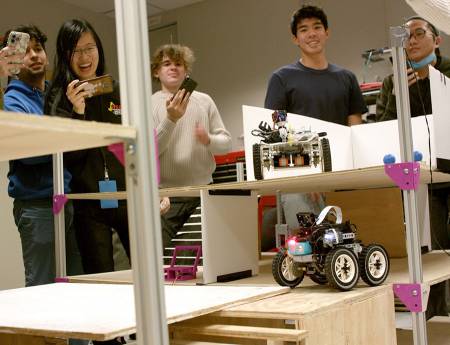The Bachelor of Science in Robotics will fuse the school’s rigorous computer science curriculum with the university’s world-renowned work in robots, computer vision and artificial intelligence through new courses designed specifically for undergraduate students and taught by leading professors in the Robotics Institute.
“Carnegie Mellon University and the School of Computer Science again chart a new path in robotics education with our Bachelor of Science in Robotics,” said Martial Hebert, dean of the School of Computer Science and a professor of robotics. “This degree will equip students with the skills needed to steer technological advancements and confront real-world challenges with unwavering zeal and unparalleled ingenuity. Our graduates will be in demand for important roles in industry and highly desirable for further research opportunities.”
CMU’s Bachelor of Science in Robotics is the first undergraduate robotics degree offered by a leading computer science program. Students will complete the same core curriculum as all incoming SCS undergraduates, mastering concepts of computer science, data structures and programming. Its focus on the computer science aspect of robotics rather than engineering sets the degree apart from most undergraduate robotics programs offered by other universities.
The degree will feature new courses in robotic building, planning and control; cognition systems, manipulation and mechanisms; and computer vision and sensing. Students in the program will also take the RoboMath course to give them the solid foundation in linear algebra, calculus, probability and statistics needed to master algorithms and apply them as they design, prototype, fabricate and test their own robots.
“Robotics can make cars and airplanes safer, help people with physical limitations lead healthier, richer lives at home, clean up crippled nuclear reactors, explore the surfaces of other planets, and enable sustainable agriculture. Robots can change the world, and the new Bachelor of Science in Robotics gives current and incoming SCS students a pathway into this exciting industry,” said Matthew Johnson-Roberson, the director of the Robotics Institute and a robotics professor. “We are filling a demand for more robotics-focused courses and for more well-rounded, diverse, highly trained roboticists.”
Carnegie Mellon University pioneered the academic study of robotics. It established the Robotics Institute in 1979, the first academic department in the United States devoted to the field. In 1989, the Robotics Institute launched the first robotics Ph.D. program in the world. The Robotics Institute now offers its Ph.D. program, three master’s degrees, an undergraduate minor and an additional major in robotics. The Bachelor of Science in Robotics is the institute’s latest offering and features the same philosophy prevalent in all its academic programs: creating machines and systems that work.
The program is the fifth undergraduate degree offered by the School of Computer Science, joining bachelor’s degrees in artificial intelligence, computational biology, computer science and human-computer interaction.
CMU decided to launch this new degree only after it felt the field of robotics had matured enough to make an undergraduate degree valuable. For decades, jobs in robotics were limited to people with graduate degrees. As the industry has grown, so has the demand for workers.
“Graduates will be able to step into some of the most exciting jobs in an innovative industry,” said robotics professor George Kantor, co-director of the Bachelor of Science in Robotics and the associate director of education in the Robotics Institute. “Robotics has transformed from a research-intensive field into one that is creating opportunities.”
Incoming School of Computer Science students can declare the robotics major at the end of their first year. Current sophomores or juniors in the school may transfer into the program, which expects to enroll 10 students for the fall 2023 term and 25 students each year thereafter.
More information about the Bachelor of Science in Robotics program is available on the Robotics Institute’s academic programs website.
